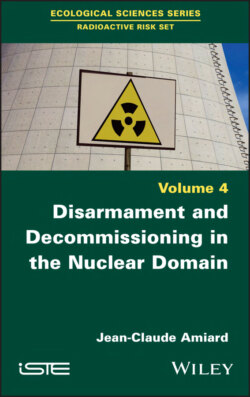Читать книгу Disarmament and Decommissioning in the Nuclear Domain - Jean-Claude Amiard - Страница 12
1
Nuclear Non-Proliferation 1.1. Introduction
ОглавлениеNuclear weapons pose an immense risk to human beings, as well as to all living beings and to the environment. For this reason, many individuals and organizations have been working to limit the number of states capable of manufacturing this type of weapon.
UN efforts to prevent, or at least limit, nuclear proliferation are significant and ongoing. For example, the UN Security Council Resolution 1540 (April 28, 2004) echoes the terms of the UN Security Council’s statement from January 31, 1992 by stating that “the proliferation of nuclear, chemical and biological weapons, as well as their means of delivery constitutes a threat to international peace and security”. However, in this resolution, it is the risks associated with the acquisition of such weapons by “non-state actors” that are specifically targeted. Some analysts consider that this resolution may justify the use of force to combat proliferation [IRS 19b].
Unfortunately, and in spite of its efforts for 35 years, it is obvious that the UN’s policy of nuclear disarmament has been a failure. The traditional vision of security that seems to be shared by the actors involved in the process of arms control and nuclear disarmament limits their capacity and willingness to abolish this type of armament [LAZ 06]. Hence, France and the United States are exerting strong pressure on the French-speaking states and on Japan to not sign the treaty on the Prohibition of Nuclear Weapons (TPNW).
In an interview with the IRIS (Institut de Relations Internationales et Stratégiques, the French Institute for International and Strategic Affairs), Jean-Marie Collin [COL 18b], expert and spokesman for ICAN FRANCE, an organization awarded the Nobel Peace Prize in 2017, noted that nuclear weapons constitute a permanent and very real danger for the international community; otherwise, no treaty would have been signed at the UN, and the nuclear deterrent would be null and void. The International Committee of the Red Cross (ICRC) has stressed that no international plan or actor will be able to adequately address the needs of victims in the event of the use of nuclear weapons.
Nuclear weapons operate on the balance of terror. However, the problem with balance is that the risk of falling is always great. This “balance” is undesirable to an overwhelming majority of the world, because their security is directly at stake [COL 18b].
